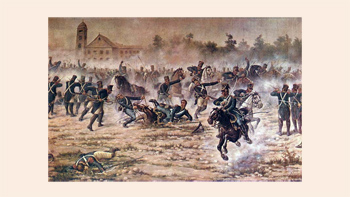The Latin American Wars of Independence, also known as the Spanish American Wars of Independence, were a series of revolutionary conflicts that took place in the early 19th century across various regions of Latin America. These wars were driven by a strong desire for self-determination, freedom from Spanish colonial rule, and the aspiration to establish independent nations. This article delves into the historical background, key figures, significant events, and lasting impacts of these pivotal moments in Latin American history.
Historical Background
The roots of the Latin American Wars of Independence can be traced back to the late 18th century when Enlightenment ideas, such as liberty, equality, and fraternity, began to spread across the Americas. These ideas ignited a sense of political awakening among the people living under Spanish colonial rule. Influenced by the American and French Revolutions, Latin American intellectuals and leaders started to question the legitimacy of colonial authority.
Another important factor contributing to the desire for independence was the Napoleonic Wars in Europe. When Napoleon invaded Spain in 1808, it led to political instability in the Spanish colonies. This turmoil created an opportunity for local leaders to challenge Spanish rule and advocate for autonomy.
Key Figures
Several remarkable figures emerged as leaders of the independence movements. One of the most prominent figures was Simón Bolívar, often referred to as the "Liberator." Bolívar played a central role in the liberation of several South American countries, including Venezuela, Colombia, Ecuador, Peru, and Bolivia. His vision of a united South America, known as Gran Colombia, sought to break free from Spanish control.
Another influential leader was José de San Martín, an Argentine general who played a crucial role in the liberation of countries in the southern cone of South America, including Argentina, Chile, and Peru. San Martín's military campaigns were instrumental in weakening Spanish colonial forces.
Major Battles and Events
The Latin American Wars of Independence were marked by a series of significant events and battles that shaped the course of history. These conflicts were instrumental in liberating numerous Latin American nations from Spanish colonial rule and forging the path towards independence and self-determination.
One such event was the Battle of Boyacá in 1819, a decisive confrontation in Colombia that led to the nation's independence. Simón Bolívar's daring crossing of the Andes and his subsequent victory at the Battle of Ayacucho in 1824 played a crucial role in securing Peru's freedom. The Battle of San Lorenzo in 1813 was a pivotal moment in Argentina's quest for independence, led by General José de San Martín.
The Battle of Carabobo in 1821 marked a significant turning point for Venezuela's independence movement, with Simón Bolívar leading the charge to secure freedom from Spanish colonial forces. In 1810, Chile's first steps toward independence were taken during the Chilean War of Independence, culminating in the Battle of Chacabuco in 1817 and the subsequent Battle of Maipú in 1818.
The year 1825 saw the Battle of Ayacucho in Peru, a decisive engagement that led to the end of Spanish rule in South America. In Mexico, the Mexican War of Independence, which began in 1810, concluded with the signing of the Plan of Iguala in 1821, granting Mexico its independence.
Throughout these battles and events, the role of women in the independence movements should not be overlooked. Women like Manuela Sáenz, Juana Azurduy, and Leona Vicario played critical roles in supporting the cause of independence through espionage, nursing wounded soldiers, and even taking up arms themselves in some cases. Their dedication and contributions were invaluable to the success of the independence movements.
These major battles and events, along with the resilience and determination of countless individuals, are a testament to the enduring spirit of liberty and self-determination that continues to shape the nations of Latin America today.
Lasting Impacts
The Latin American Wars of Independence resulted in the establishment of numerous independent nations across the region. These newly formed countries faced significant challenges in the aftermath of the conflicts, including the task of creating stable governments and forging national identities.
One lasting impact of these wars was the abolition of slavery in many Latin American countries. The struggle for independence highlighted the inherent contradiction between the fight for liberty and the continuation of slavery, leading to the eventual emancipation of enslaved individuals in various nations.
The wars also left a deep imprint on Latin American culture, with many countries celebrating their independence days with colorful festivals, parades, and cultural events. These celebrations serve as a reminder of the enduring legacy of those who fought for freedom.
Holidays Linked to Latin American Wars of Independence
The Latin American Wars of Independence left an indelible mark on the region's cultural and national identity, and this is evident in the various holidays celebrated in honor of these historical events. One of the most notable holidays is Colombia's Independence Day, celebrated on July 20th each year, which commemorates the Battle of Boyacá and Colombia's path to freedom. In Peru, Independence Day, celebrated on July 28th and 29th, marks the anniversary of José de San Martín's proclamation of independence and the Battle of Ayacucho. Venezuela celebrates its independence on July 5th, remembering the pivotal moment when a young Simón Bolívar led the nation towards freedom. These holidays are not only a testament to the sacrifices made during the wars but also a vibrant celebration of the rich cultural diversity and unity of Latin American nations.
In essence, the Latin American Wars of Independence were a pivotal chapter in the history of the Americas. They were driven by a fervent desire for self-determination, inspired by Enlightenment ideals, and led by remarkable figures like Simón Bolívar and José de San Martín. These wars not only led to the liberation of numerous countries but also had profound and lasting impacts on the region's politics, society, and culture.
